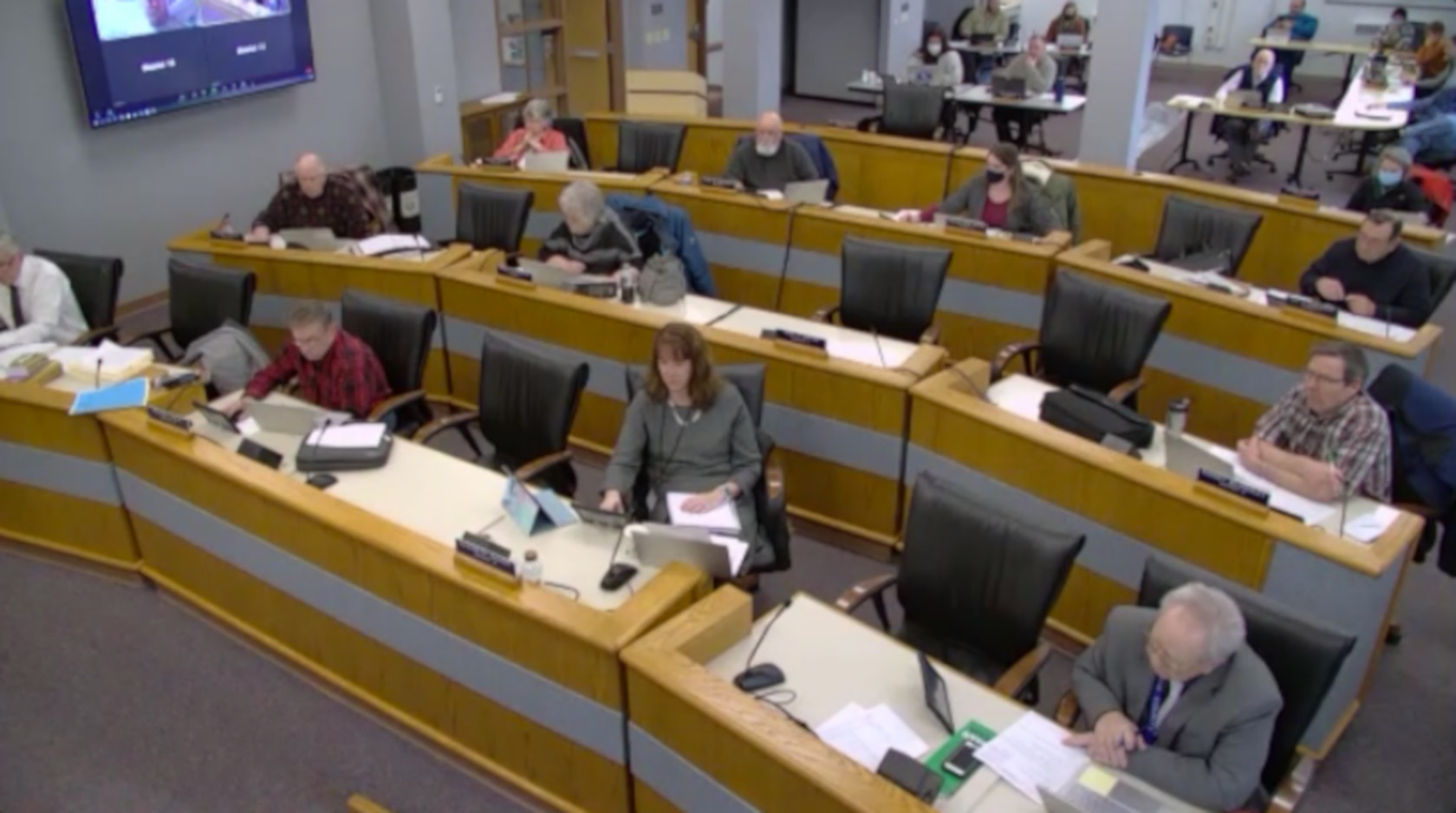Part of a series on how Door County’s use of $5.3 million in federal funding could affect social and economic issues in the community.
The Door County Board of Supervisors on Tuesday approved a broad plan for the county’s use of more than $5.3 million in federal funding, allowing initiatives for child care, addiction treatment, affordable housing and other county priorities to move forward.
The resolution the board passed is a “strategic initiative plan” that outlines five priority areas for the county’s use of funding from the federal American Rescue Plan.
It gives county staff department leaders clarity on the County Board’s direction with the funding, allowing them to proceed with putting together specific plans for the initiatives, some of which are time-sensitive. Those plans still must be reviewed by the appropriate oversight committees of the County Board. They then must have funding formally allocated to them by votes of the finance committee and the full board.
The resolution sets aside general funding totals for each priority area and lists projects under each area that the county initially brought forward last month. For some of the areas, such as health and human services and the environment, the resolution lists additional priorities for which initiatives could be developed if there is funding remaining.
The funding must be used for costs incurred since March 3, 2021. It must be obligated by the end of 2024 and spent by the end of 2026.
The priority areas outlined in the plan are:
- Affordable housing ($1.2 million). This includes $500,000 toward a new revolving loan fund that would fund the construction of affordable housing developments, and a total of $700,000 toward a new, 45-unit affordable housing development in Sister Bay, with $500,000 going to the developer (Mosaic Ventures) and $200,000 going to the municipality. County Land Use Services director Mariah Goode has said the Sister Bay development is shovel-ready.
- Broadband internet ($1 million). This includes investments in infrastructure to expand broadband access county-wide—as outlined in a 2021 report commissioned by the Door County Economic Development Corporation—as well as a new county broadband coordinator position to oversee those investments. The investments would come in the form of support for municipality-led broadband expansion projects, as well as possibly some investments in what county administrator Ken Pabich has called “backbone” infrastructure that would help to tie the various smaller networks together.
- Environment ($800,000). This includes efforts to expand groundwater testing and invasive species control: new screenings of private wells for what the county refers to as “emerging” contaminants on which little to no data exists, and controlling 120 acres of non-native Phragmites. The “emerging” contaminants include PFAS, microplastics, pharmaceuticals and other chemicals. The Phragmites control would target about 85 percent of the known Phragmites populations on private property county-wide, according to a proposal document from county conservationist Erin Hanson. The strategic initiative plan also allows the county to bring forward additional environmental initiatives with any remaining funding in this area.
- Health and human services ($1.2 million). This includes the purchase of a building to house a new sober living facility for the county, as well as efforts to bolster child care county-wide, particularly by focusing on home-based child care providers. The sober living facility would fill a crucial void in Door County’s addiction treatment and recovery resources, county Health and Human Services (HHS) director Joe Krebsbach has said, and it would allow for more flexibility and better outcomes in treatment while saving the county money. The facility would be run by an outside company. The child care initiatives would include support for child care providers in the form of grants and training, as well as funding toward a new child care coordinator position at United Way of Door County. The child care efforts are designed to complement the projects funded by the $3.5 million state grant that United Way was awarded in December. With any remaining funding beyond the sober living and child care initiatives, county HHS staff could develop initiatives to improve mental health programs and services in the county, which the County Board also has identified as a priority.
- Public health, protection and safety ($674,185). This broadly defined category includes a new training program for Door County Emergency Services intended to bolster its recruitment efforts, one year of premium pay for county employees deemed essential workers, and funding toward replacing all rural street address signs county-wide. The emergency services training program would sponsor the initial education of four EMTs, two advanced EMTs, and two paramedics per year for five years. Students whose education costs were covered by the program would be required to commit to working for Emergency Services for a set period of time. There has been some disagreement about the premium pay and rural address signs items. The county’s Health and Human Services board initially discussed providing premium pay for Public Health workers in recognition of their work during the pandemic, but the administrative committee expanded the proposal to include all county employees. The proposal must be reviewed again by the administrative committee before it can move forward. County Board members also have disagreed over whether the rural address signs replacement should be paid for with the federal funding or through another county funding source such as cash reserves.
- Reserve funds ($500,000).
Initiatives under the broadband and environmental areas already have had some funding formally allocated to them. The board on Tuesday approved funding for 2022 for the Phragmites control and well water testing. It also passed two resolutions in support of several Door County municipalities’ efforts toward broadband expansion. The board last month approved funding for 2022 for the salary of a new broadband coordinator position.
Board debates funding flexibility
The County Board vote comes after the board’s finance committee last week amended the strategic initiative plan resolution—initially crafted by Pabich and board chair David Lienau—to include the sixth category for reserve funds. That was intended to allow the county more flexibility in terms of where it allocates funding and to cover unexpected costs as the initiatives develop, finance committee chair David Englebert said at the meeting Tuesday.
The $500,000 in the reserve funds category came from reducing the amounts set aside for health and human services and environmental issues. Both of those areas’ funding totals had been increased since the initial January proposals for using the federal money.
Supervisor Bob Bultman, who represents the Town of Baileys Harbor and part of the town of Liberty Grove, said Tuesday he disagreed with taking money from the health and human services and environmental areas for the reserve funds.
Bultman made a motion to amend the resolution to add an item under the environmental area for sustainability initiatives. He said he hoped to see the county hire a sustainability coordinator who would lead efforts to bring the county’s facilities to a carbon-neutral or carbon-negative status.
Bultman’s motion failed on a vote of 11-9. County Board vice-chair Susan Kohout, who voted no, said she didn’t want to prescribe the use of any remaining funding beyond the initiatives the county has proposed, preferring to let county staff and the appropriate oversight committees bring forth ideas.
The resolution then passed on a 19-1 vote, with Bultman the only “no” vote. Supervisor Todd Thayse, who represents parts of the towns of Brussels and Forestville, was not present.
The broadband-related resolutions the board passed Tuesday are in support of Door County municipalities’ grant applications to the Public Service Commission of Wisconsin for funding toward broadband internet expansion.
One grant application comes from the towns of Clay Banks, Forestville, Nasewaupee, Sturgeon Bay and Sevastopol and would work with Charter Communications. The other application comes from the town of Baileys Harbor and would work with Nsight Teleservices. The resolutions commit $25 of the county’s federal funding per home or business that is connected to broadband in those areas through the expansion efforts.
Pabich said he is in the process of setting up interviews with candidates for the broadband coordinator position.
Other notes
Also Tuesday, the board passed a set of amendments to the county’s comprehensive zoning ordinance. The changes are intended to clean up some outdated language and to make affordable housing development easier, Goode told the board. They include reductions of the minimum square footage requirements for some types of housing and came after two years of collecting ideas for zoning changes, beginning with a county study in 2019 on affordable housing, Goode said.
The board also discussed the possibility of restructuring its committees to align with a structure used by some other Wisconsin counties, including La Crosse County. The changes would include replacing the administrative committee with an executive committee composed of the board chair and the chairs of six other major committees. They also would include consolidating and/or downsizing some committees.
Pabich said the new structure would be more consolidated and could lead to more involvement by County Board members. Supervisor Dan Austad, who represents part of the City of Sturgeon Bay, suggested setting the size of the committees at seven, rather than the proposed five.
The board will continue to discuss the restructuring idea in the coming months.
Lily Sweeney contributed reporting.

